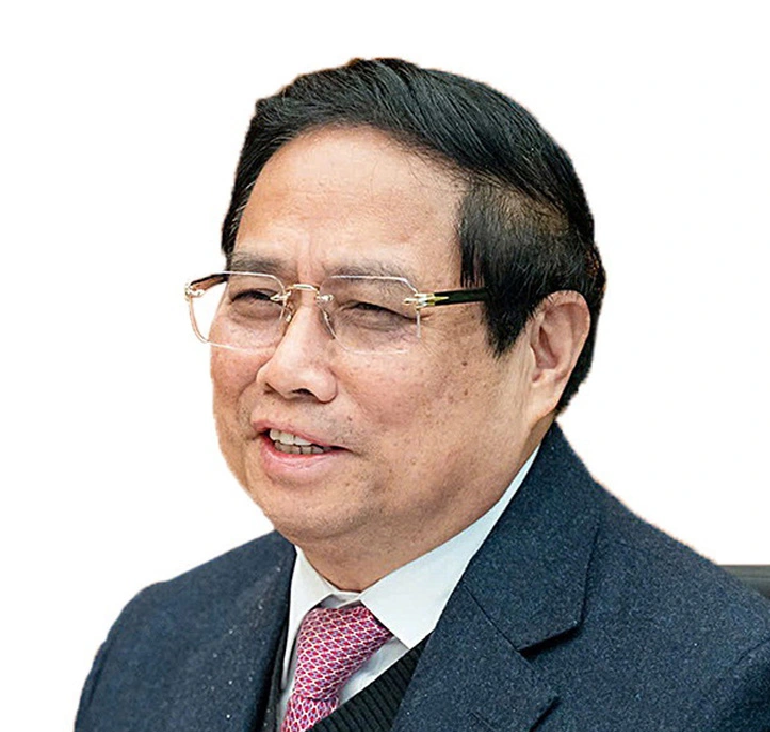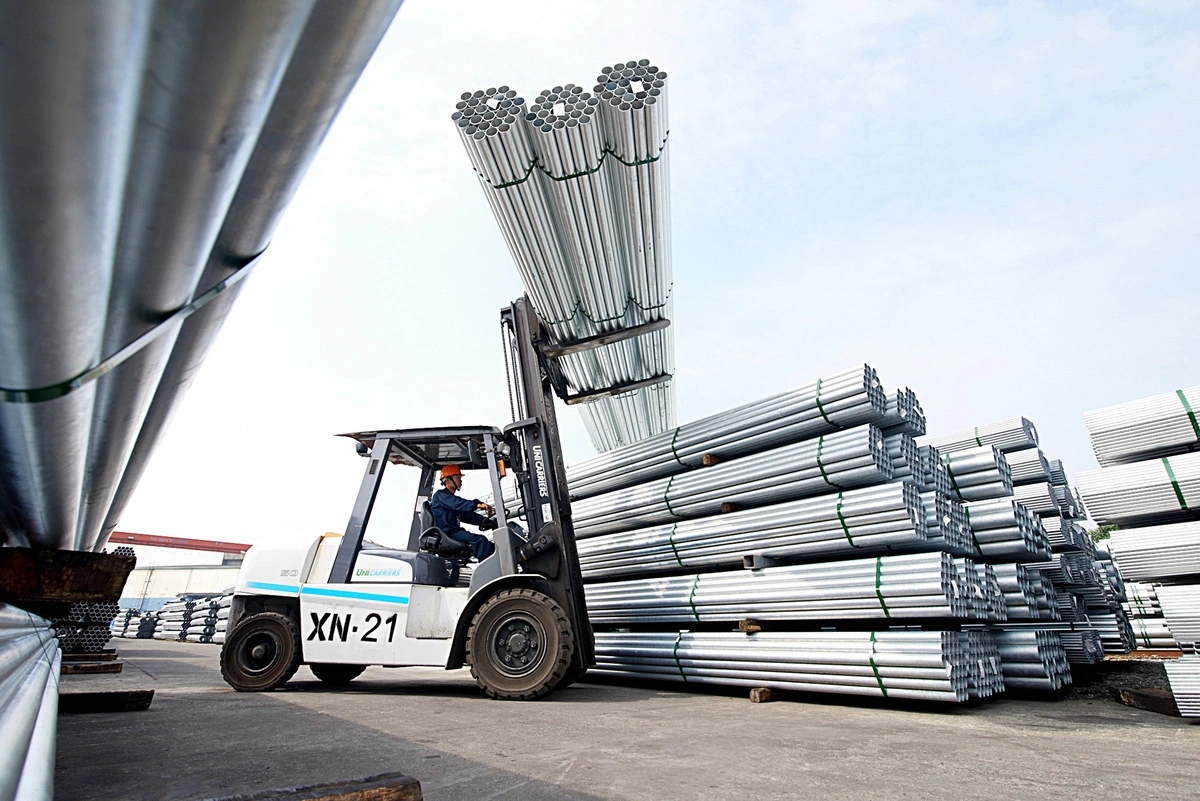Vietnamese Prime Minister Pham Minh Chinh has recently asked leading domestic private corporations to engage in key national infrastructure projects, such as high-speed railways and nuclear power plants.
The total investment needed for these projects is expected to amount to hundreds of billions of U.S. dollars. Leading domestic private corporations are capable of taking charge of many key items of these projects.
Opportunities for domestic firms
Many experts believe that the government’s request opens up great development opportunities for the domestic private sector, encouraging the formation of domestic production and supply chains in the future.
In response to the prime minister's request at a recent meeting between the government and 26 private corporations, Tran Ba Duong, chairman of Truong Hai Auto Corporation (THACO), affirmed that the firm would join urban railway projects, particularly the production of train cars and steel components.
Duong stated that THACO has engineers experienced in product research and development and international cooperation. Therefore, THACO is committed to transferring technology, manufacturing locally to reduce costs, and ensuring the quality of projects.
The corporation will also help small and medium enterprises join its production chain.
Meanwhile, Tran Dinh Long, chairman of steelmaker Hoa Phat Group, shared that as Vietnam’s leading steel manufacturer, which has exported products to 40 countries and territories, the group is focused on producing high-quality steel to replace imported goods.
Long was confident that Hoa Phat is capable of researching and producing railway rails, steel for train wheel axles, and high-speed trains as requested by the prime minister, as well as high-quality steel for key national projects and global export.
Regarding a plan to invest VND10 trillion (US$393.8 million) in a rail track production project, Long hoped there would be specific policies for the project.
Vietnamese firms capable of executing major projects
Hoang Quang Phong, vice-chairman of the Vietnam Chamber of Commerce and Industry (VCCI), told Tuoi Tre (Youth) newspaper that domestic private enterprises have the capability to undertake the construction of key national infrastructure projects.
Some domestic private corporations are strong enough to compete fairly with foreign ones and carry out enormous tasks, Phong noted, adding that the first jobs are to instill confidence in domestic private enterprises and launch appropriate mechanisms to help these corporations confidently implement the government’s plans as the prime minister has shown trust in these firms.
If one domestic corporation cannot complete the task, they can cooperate with other domestic companies.
 |
| Vietnamese Prime Minister Pham Minh Chinh. |
This is also an opportunity to localize the production and supply chain, Phong added.
Meanwhile, Nguyen Chi Sang, chairman of the Vietnam Association of Mechanical Industry, claimed that Lao Cai - Hanoi - Hai Phong railway, urban railways, and part of the North-South high-speed railway offer great opportunities for the mechanical industry as some components and equipment could be localized by up to 50-60 percent.
Sang added that domestic mechanical enterprises can now produce carriages, chassis, car body supports, electrical systems, transformers, railway ties, and springs.
The key is to divide the tasks into specific components and determine who is capable of handling each part, Sang noted.
It is also important to calculate the actual demand and costs.
A representative from the Ministry of Industry and Trade announced that the ministry had established a working group to help domestic enterprises join the railway sector.
The working group will coordinate with associations and businesses to review, research, and assess the participation of domestic enterprises in the manufacturing of rail components.
PM Chinh said the government had directed relevant ministries to issue regulations to facilitate domestic enterprises' participation in major national projects, which will contribute to promoting economic growth.
Not only large corporations but also small and medium enterprises can take part in the country’s significant undertakings.
Based on specific situations and legal regulations, ministries should establish clear requirements, criteria, and standards, ensuring transparency and fairness, while preventing corruption, waste, and delays.
Supporting small and medium enterprises not only creates collaboration opportunities for this sector but also generates employment and widespread economic benefits. To achieve overall growth, all ministries, localities, businesses, and citizens must contribute to national progress, the government leader affirmed.
According to Tran Hong Quang, director of the Vietnam Institute for Development Strategies under the Ministry of Planning and Investment, the country must rely on domestic enterprises to carry out key national projects to build an independent and self-reliant economy.
This is also a significant challenge, requiring advanced technology and the importation of expertise.
The government’s approach to task large domestic private corporations with executing important projects is correct, but solutions and appropriate plans are necessary to support domestic enterprises in adopting and mastering technology.
Experience from Japan and South Korea shows that supporting domestic enterprises should aim at helping them master technology and lead sectors, Quang added.
Associate Professor and Doctor Hoang Van Cuong, a member of the National Assembly’s Finance and Budget Committee, stated that many state-owned and private corporations have grown to become highly competitive, producing products that rival those from abroad.
 |
| Vietnam's largest private conglomerate Vingroup is studying the development of a metro line connecting downtown Ho Chi Minh City with coastal Can Gio District, using its own funds. Photo: Quang Dinh / Tuoi Tre |
Many enterprises have developed significant resources, accumulated experience, and possess strong management capabilities and highly skilled workers who can absorb and operate new technologies.
However, the government should provide support so that they can contribute to the country’s development through large projects, helping build an independent and self-reliant economy.
Domestic firms’ participation in large infrastructure projects also help create jobs and boost local production.
Ho Chi Minh City effectively supports investors
At the beginning of this year, chairman of Ho Chi Minh City People’s Committee Phan Van Mai called on investors to propose major projects in the city.
Most recently, Vietnam's largest private conglomerate Vingroup has proposed an investment plan for a subway line connecting downtown Ho Chi Minh City with coastal Can Gio District, using its own funds, and Ho Chi Minh City Infrastructure Investment JSC suggested a transit oriented development project from Hang Xanh Intersection in Binh Thanh District to Binh Trieu Bridge connecting Binh Thanh District and Thu Duc City.
Dr. Huynh The Du, an economist, said these proposals are essentially models for public-private partnership investment, which boasts many benefits for both private enterprises and the society.
However, to ensure the success of these projects, government support is necessary.
According to Du, the government’s role is to optimize the use of social resources, ensuring the efficient use of available funds.
When private corporations undertake major projects, they will strive to speed up the process in a bid to avoid delays that could increase costs. However, this depends on government support for land clearance and procedures.
The main obstacle preventing private investors from engaging in major projects has been the inefficiency of the state management, which fails to resolve the issues that hinder private enterprises, causing delays and increasing risks, Du claimed.
Like us on Facebook or follow us on Twitter to get the latest news about Vietnam!

















































